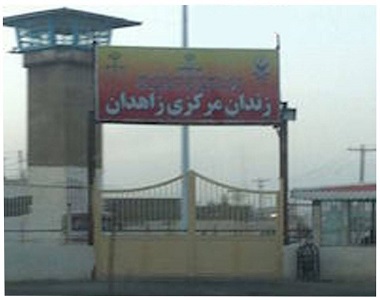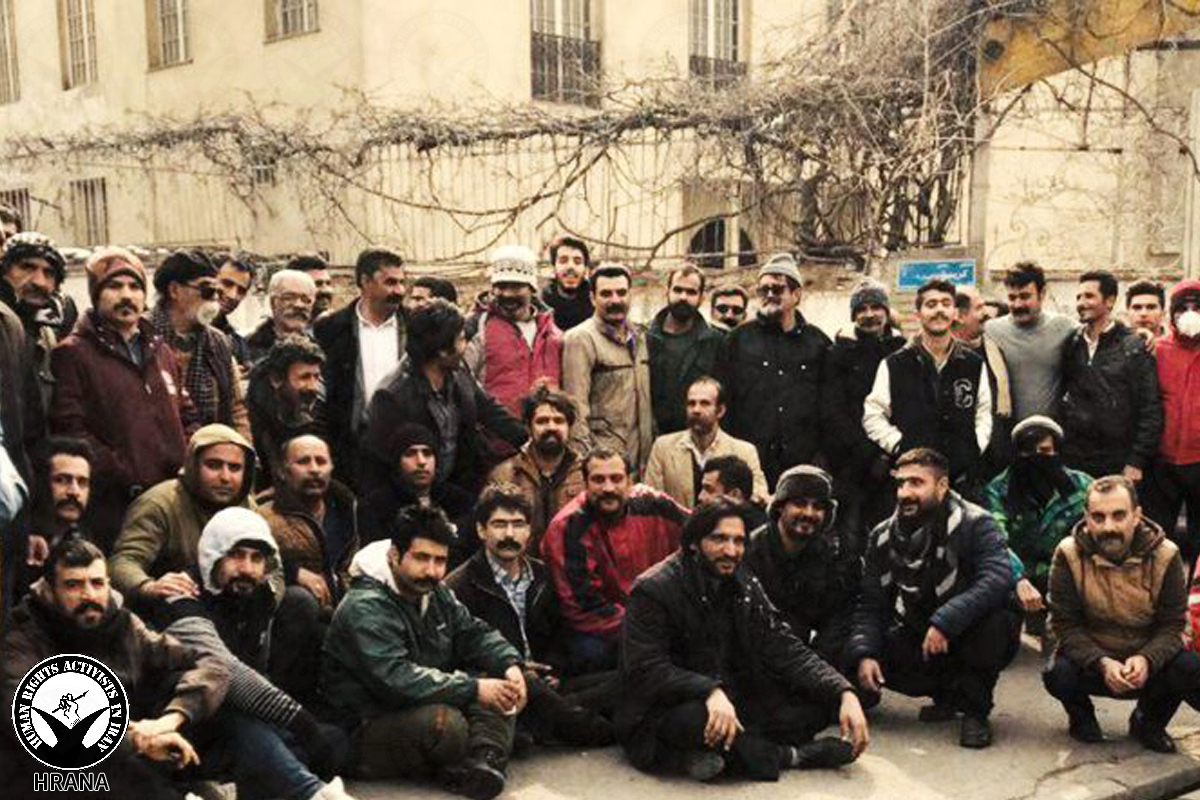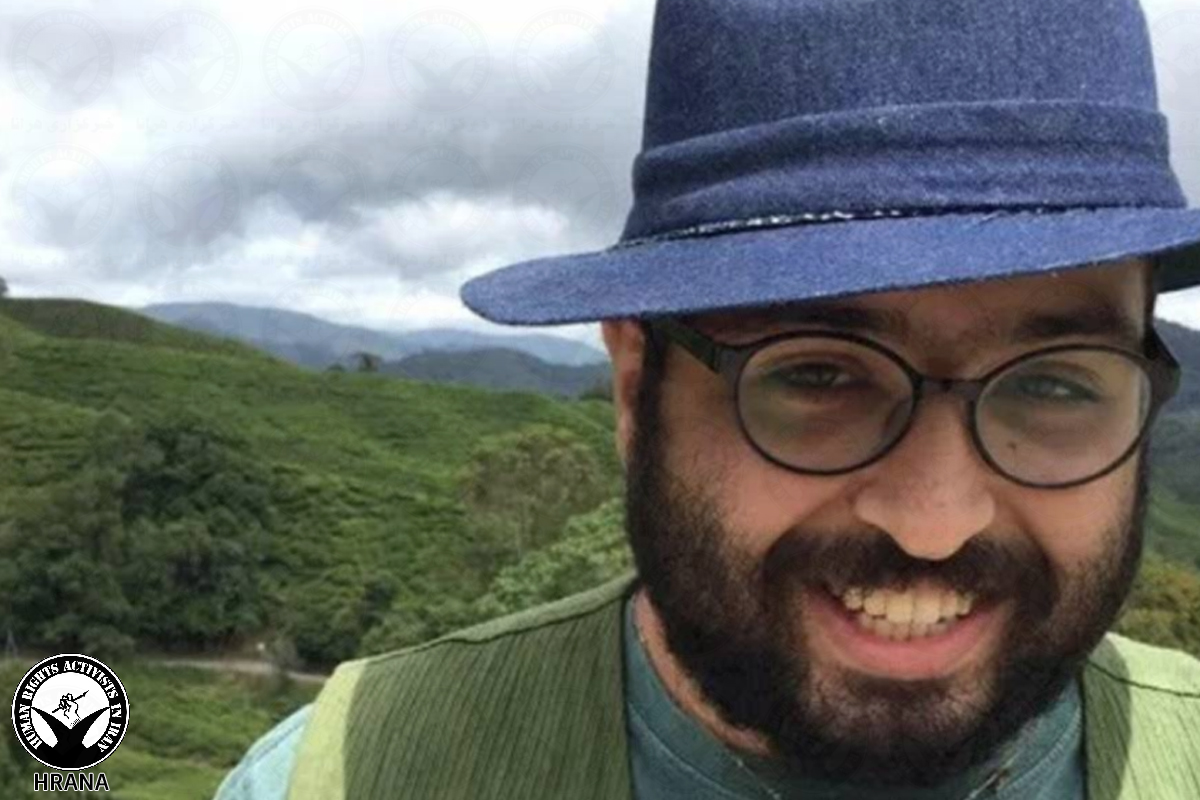Human Rights Activist News Agency (HRANA) – Iranian citizens continue to speak out on behalf of their imprisoned loved ones and compatriots, and Hejar Alipour’s voice is the most recent to join the throng of support. In an open letter, Alipour defends the rights to family visitation, family contact, and attorney consultation for Mohammad Ostadghader and his own brother Houshmand Alipour, both of whom are imprisoned on charges of “membership in Kurdish Anti-regime Parties” and–if the fears of human rights organizations prove true–may be on track to the death penalty.
Four days after the August 3rd arrest of Alipour and Ostadghader by the Ministry of Intelligence, Iranian National Television broadcasted a recording of the two men confessing involvement in an attack on a Saghez security base. Both have been barred from contacting their families since the day of their arrest, with the exception of a short phone call from Alipour to his family September 1st, in which he said he had been coerced to confess under threat of torture.
Amnesty International recently published a press release expressing grave concern about the imprisonment and forced confessions of the two men: “Mohammad Ostadghader was shot and injured during the arrest but has been denied medical care,” the press release stated, adding that the prisoners have been held in an unknown location, out of reach from their families or lawyers. “[We are] concerned that the nature of the accusations against them and their forced televised confessions may be a precursor to charges that incur the death penalty.”
In defense of the rights of prisoners like his brother Houshmand, Hejar Alipour pleads their case to the international human rights community in the letter below, translated into English by HRANA:
“It has been two months since my brother Houshmand Alipour and his friend Mohammad Ostadghader were trapped by intelligence officers of the Islamic Republic at the Keh Li Khan Mountain Pass near the city of Baneh. Since then, we have had no news of or contact from my brother Houshmand, other than a few-minute-long phone call from him during which he told us that he is detained at the Intelligence Office of Sananadaj. The Intelligence officers lied to him, promising that they will allow him contact and visits with his family. Yet he continues to be banned from having visitors and has not had permission to contact the family. We retained two attorneys for Houshmand who went to the prison, the Judicial Office, and the Intelligence Office of Kurdistan province in order to make arrangements to represent him. However, the intelligence and security officers of the regime refused the meeting and turned them away.
The lives of Houshmand and Mohammad are in serious danger. Under torture, they have been forced to falsely implicate themselves, thus validating national security charges being levied against them. The Islamic Republic is bound to Islamic Penal Code, Shari’a law, and its own provisions, i.e. criminals’ and accused citizens’ rights to a fair trial, an attorney, and official legal visitation, at least within a number of days of arrest. In the case of Houshmand and Mohammad, the Islamic republic is not only violating its own principles and Islamic judicial proceedings but also denying defendants’ most basic rights by treating them inhumanely and employing physical violence and torture. The extraction of confessions under violent torture, the broadcasting of those confessions on August 7, 2017, the refusal to allow contact with attorneys or families, and denying visitation, are all violations of the basic rights of any prisoner, be they political or criminal; of rights set forth by the Islamic Republic […]
By international human rights standards, and even by the standards of the Islamic Republic, any mistreatment, or forced confession under torture, is an inhumane and criminal act. The Islamic Republic is not holding itself accountable to any principle of morality or humanity[…]. Considering the circumstances, and as the family of political prisoner Houshmand Alipour, we are concerned about the physical conditions of Houshmand and Mohammad, and of their restricted access to medical care. We hold the intelligence and judicial officials of the Islamic Republic responsible for any physical outcomes of the dangers they currently face.
We have announced the Campaign to Save the Life of Houshmand Alipour and ask all freedom-loving, humanitarian people of the world to join our campaign so that we can prevent the slow death or execution of these two prisoners by the Islamic Republic. On September 11, 2018, Amnesty International announced an urgent and accelerated campaign to save the lives of Houshmand and Mohammad, expressing its concern and demanding that authorities address the appalling state of deprivation that these two prisoners are in. This campaign was circulated to all international human right organizations, the European Union, the United Nations, and other institutions defending Human rights. In Canada, we were able to spread the word about my brother Houshmand’s case with the help of Amnesty International and Center for Victims of Torture, as well as through contacts with Canadian parliament and ministers. We ask the Canadian Government to immediately condemn the Islamic Republic’s violation of the most basic rights of these two prisoners, i.e. to visitation with the attorney and the family. Please join the Campaign to Save the Life of Houshmand Alipour, to save Houshmand and Mohammad’s lives. Help us lift their voices to the level of governments and human rights institutions. We thank all those who have already expressed their support and concern for the life of my brother.”
Author: admin-hr
State of Mental Health Critical for Zahedan Political Prisoner Held Six Years Without Trial
Human Rights Activists News Agency (HRANA) – A hostage of judicial bureaucracy for six years and counting, political prisoner Meysam Chandani, 28, has recently experienced a serious psychological downturn, a close source told HRANA.
“He is suffering from severe psychological illness due to the pressures of incarceration, the living conditions inside, and his legal limbo,” the source said. “He makes noises throughout the day and night, behaves strangely, and has caused problems for his ward mates.”
Currently held in section 4 of Zahedan Prison in the southeastern province of Sistan and Baluchestan, home to Iran’s Baloch minority, Chandani was arrested six years ago by the Ministry of Intelligence forces of Saravan county and charged with “acting against national security,” “Moharebeh (enmity against God) through armed activities,” and “membership in an opposition group.” Unable to post his 5 billion toman (approximately $1,250,000 USD) bail, he has been waiting on his sentencing–or any updates at all–ever since.
In the meantime, prison officials refuse to attend to his medical needs, which according to eyewitnesses reports are growing more serious by the day.
While prison management has no direct responsibility to nudge the judiciary about lagging case files, they have been slow to address the prison’s dearth of communication channels with the judiciary and its general lack of social aid workers, shortcomings which make the follow-up process too difficult for some prisoners to undertake themselves.
Overpopulation has become a prevailing issue at Zahedan prison, where officials routinely disregard or postpone consideration of prisoner requests for sentencing reduction via part-time sentence schedules, furlough, and conditional pardon.
HRANA has previously reported on general lack of medical treatment in Zahedan Central Prison, based on interviews with eyewitnesses. The prison also hosts many who suffer from legal limbo like Chandani. This is in direct contravention of Article 9 of the International Covenant on Civil and Political Rights–of which Iran is a signatory–which guarantees arrestees the right to a prompt trial and to be promptly informed of the extent and nature of any charges on which they are being detained.
18 Dervishes starving to death; prison warden says “So what?”
Human Rights Activists News Agency (HRANA) – In the past month alone, eighteen hunger striking Gonabadi Dervish prisoners in Iran have been beaten with batons, tased, and electrically shocked – and now, the prison’s warden has outwardly stated that it is not his concern if they die.
The prisoners were first beaten by prison guards at Great Tehran Penitentiary on August 29th, after they held a sit-in to protest the beating of female members of their religious minority in Gharchak Prison in Tehran’s east. After guards violently broke up the sit-in, 18 Dervishes were transferred to solitary confinement, and all 18 went on hunger strike in protest. To date, they have not had a single meal, or any food at all, in more than 30 days.
When some of their fellow cellmates expressed concerns about the physical conditions of some of the hunger strikers, the prison’s warden, known only as Farzadi, responded thusly: “So what if they die?”
According to Majzooban Noor, a news website that focuses on Dervish issues, the hunger strikers are suffering from vertigo and reduced blood pressure. Specifically, the physical condition of Mojtaba Biranvand has been described as critical. He had previously been sent to a clinic due to severe physical weakness. Refusing to break his hunger strike, he has rejected supplemental injections.
Abbas Dehghan, another hunger striker held in the same penitentiary, has only one kidney and is greatly suffering from the toll the strike has taken on him.
The August 29th attack targeted Dervishes in ward 3 of the prison. Eighteen Dervishes from Section 4 who protested the treatment of their fellow prisoners were also sent to solitary.
Previously, on September 1st, HRANA reported that three Dervishes had gone on hunger strike: Ali Bolboli, Salehodin Moradi and Mohammad Reza Darvishi. On September 2nd, Majzooban Noor added six more hunger strikers to the list: Abbas Dehghan, Ali Mohammad Shahi, Mojtaba Biranvand, Ali Karimi, Jafar Ahmadi, and Ebrahim Allahbakhshi, On Monday, three more people joined them: Heydar Teymoori, Majid Yarahmadi, and Saeed Soltanoor. On Tuesday, five more dervishes joined the hunger strike: Babak Taghian, Ehsan Malekmohammadi, Sekhavat Salimi, Reza Bavi and Akbar Dadashi. The last Dervish to join was Majid Rashidi.
The Dervishes demand the end to the house arrest of their spiritual leader, Noor Ali Tabandeh. Their other demands include releasing female dervish prisoners from Gharchak Prison and reuniting all imprisoned dervishes in one single section of the GTP.
All of the Dervishes were arrested in relation to what has become known as the Golestan Haftom incident, named after the street on which it occurred. The incident occurred when a gathering of several hundred Gonabadi Dervishes was violently confronted by Iranian police and plainclothes members of the Revolutionary Guard’s Basij faction outside the residence of their spiritual leader, Noor Ali Tabandeh. The Dervishes had gathered to prevent his possible arrest.
In the violence that followed, hundreds were injured and many arrested. Though Iranian judicial authorities estimate that around 300 people have been arrested in connection with Golestan Haftom, HRANA has thus far published the names of 324 arrestees and estimates that the actual number is considerably higher.qqqgonabado
Against doctor’s orders, authorities take Arash Sadeghi back to prison after surgery
Human Rights Activists News Agency (HRANA) – Arash Sadeghi, a human rights activist imprisoned in Rajai Shahr Prison in Karaj, underwent a critical operation on September 12th for malignant bone cancer at Imam Khomeini hospital and was returned to prison just three days later, against the orders of his doctor.
According to an informed source, an individual introducing himself a judicial official insisted on the early transfer against the clear orders of doctors.
Sadeghi’s doctor had instructed that he be hospitalized under close medical supervision for at least 25 days following a very difficult surgery, said the source. According to the source, the doctor explained that Arash needs to stay in the hospital as he requires a medical team in case of stroke, infection, or severe fever. Furthermore, the medical team needs the 25 days to determine whether a patient will require chemotherapy, radiation therapy, or additional surgery.”
A source with information about Sadeghi’s condition told HRANA that specialists had determined Sadeghi needed to be hospitalized three days prior to his surgery, due to an irregular heartbeat and severe weakness, so Sadeghi could be prepared for the intensive surgery through proper nutrition and vitamin injections.
The surgical department had contacted the prison several times on September 8th, asking for Sadeghi’s transfer. Prison officials claimed, however, that the prosecution office had not issued the necessary permits for his early hospitalization. Just one day remaining until his surgery, the authorities finally transferred Sadeghi to the hospital on September 11th.
The source added that there was a heavy presence of plainclothes agents, whose organizational affiliation was unclear, in the cancer department of the hospital since early Tuesday, before Arash arrived.
Sadeghi’s surgery time had been given to another patient due to his late transfer, however, the doctor responsible for Sadeghi reportedly managed to secure an operating table. Sadeghi underwent a 7.5-hour operation, beginning on the morning of Wednesday, September 12th. Doctors removed a bone tumor from his right arm and collarbone, and samples were collected from areas suspected of metastasis, such as his rib cage and underarm. Bone taken from his pelvis was mixed with platelets and special [injectable] cement to replace the removed sections of his arm bone.
The source said that agents imposed restrictions on Sadeghi from the moment the surgery ended, thus complicating his recovery process. They prevented his stay in the recovery room as required by post-surgery procedure.
“While he was still unconscious, they handcuffed and shackled his left hand and leg, and blockaded the area around his bed, a move that prevented his doctor’s required constant checkups, and which was protested by his doctor,” the source said.
According to the source, Sadeghi suffered from wounds similar to bedsores from having to lie on his back due to handcuffs on one hand and operation bandages on the other.
Sadeghi was allowed to use the bathroom only three times a day, accompanied by three agents each time. The inhumane conditions and the restrictions imposed on Sadeghi provoked negative reactions from the hospital staff, and in several cases led to verbal altercations between them and the security agents.
Arash Sadeghi was not allowed any visitors during his stay at the hospital. His wife, Golrokh Iraee, remains imprisoned at Evin Prison serving a six year sentence.
Baha’i Crackdown Intensifies with Three More Arrests in Karaj
Human Rights Activist News Agency (HRANA) – Crackdowns on Iran’s Baha’i community continued this week with the arrest of three residents of the northwestern Tehran suburb of Karaj, who were transferred to Evin Prison on Sunday, September 16th and are now being held on approximately $23,000 USD (3 billion IRR) bail.
Maryam Ghaffarmanesh, Jamileh Pakrou, and Kianoush Salmanzadeh–participants in an environmental education session led by Ghaffarmanesh and hosted in the private residence of Ramin Sedighi–were arrested when intelligence agents showed up demanding their cell phones and pressing them to fill out personal information forms.
After confiscating Sedighi’s hard drive, pamphlets, and religious materials, the agents moved on to search Pakrou’s residence, a close source told HRANA.
Ghaffarmanesh, Pakrou, and Salmanzadeh were transferred to Evin Prison. Ghaffarmanesh’s family learned of her bail some 20 hours later, on a call with her from ward 209 of the prison.
The same day, HRANA reported that intelligence ministry agents had arrested and searched the homes of six Baha’i residents of the central Iranian city of Shiraz: Soudabeh Haghighat, Noora Pourmoradian, Elaheh Samizadeh, Ehsan Mahboob Rahvafa, and a married couple, Navid Bazmandegan and Bahareh Ghaderi.
Shiraz had already seen a string of Baha’i arrests one month earlier that landed a number of its residents in an intelligence ministry detention center.
On the morning of September 19th, Baha’i Yazd resident Mehran Bandi Amirabadi was released after being held in custody for 43 days without a warrant. After being tried with six other Baha’i citizens in Branch 3 of Yazd Appeals Court, located in central Iran, Amirabadi was sentenced to one and a half years in prison and one year in exile to be served in Divandareh, a remote city in Iranian Kurdistan.

Iranian Baha’i citizens are systematically deprived of religious freedoms, in contravention of international treaties including the Universal Declaration of Human Rights and the International Covenant on Civil and Political Rights.
Based on unofficial sources, more than 300,000 Baha’is live in Iran. Iran’s Constitution, however, only recognizes Islam, Christianity, Judaism, and Zoroastrianism, and does not acknowledge the Baha’i faith as an official religion. Consequently, the rights of Baha’is are systematically violated in Iran.
Author and Humorist Kiyumars Marzban Detained
Human Rights Activists News Agency (HRANA) – On August 26, 2018, Islamic Revolutionary Guard Corps (IRGC) Intelligence forces arrested author and satirist Kiyumars Marzban in his home, confiscating several personal items including his mobile phone and laptop.
Last year, Marzban, 26, came back to Iran after eight years abroad to visit his ailing grandmother. While he entered the country without event, Branch 1 of the Evin Prosecutor’s Interrogation office opened up a case file and arranged for his arrest within his first year back home.
While Marzban alleges he never traveled to the U.S., a state-affiliated news site has accused him of “Networking in Iran” on contract with American partners. The same news site accuses Marzban, who also teaches art, of entering Iran with the intent to sensationalize and divide the community with his classes. As of the date of this report, no further information was available about the reasons for Marzban’s arrest.
Human Rights Watch revealed in a press release that he has not been allowed to visit his family yet.
Kiyumars Marzban began his career with filmmaking in 2005. By 2009 he had produced eight short films and left Iran to develop his portfolio in Malaysia. Shortly afterward, via Facebook, he launched the world’s premier Persian-language comedy podcast, called “Radio Sangetab” (Sangtab, the name of a village in northern Iran, is also a cooking method using hot stones). His works include “Kham Bodam Pokhte Shodam Balke Pasandideh Shodam” (I was raw, I became ripe and rather pleasant) and “Aziz Jan” (Dear darling).
After Attending Funeral of Executed Political Prisoner, Sunni Preacher Answers to Special Clerical Court
Human Rights Activists News Agency (HRANA) – Pursuant to a phone summons he received one week earlier, Sunni preacher and activist Hashem Hossein Panahi was arraigned in the Special Clerical Court of Hamedan (Western Iran) on Tuesday, September 18th, presumably for participating in the funeral of executed political prisoner Ramin Hossein Panahi.
Hashem Hossein Panahi, who is also the Sunni Shariah judge and Mufti of Kurdistan province and a member of the office of Sheikh Hassan Amini, faces charges of “Propaganda Against the Regime” and “Disturbing the Public Opinion.”
A close source to Panahi told HRANA, “Hashem Hossein Panahi attended the funeral ceremony of the executed political prisoner Ramin Hossein Panahi in Gharochay village, Kurdistan province. After paying his respects and delivering a speech at the service, the Kurdistan Ministry of Intelligence office filed a complaint against him in the Special Clerical Court.”
Panahi has denied the charges leveled against him, countering that his speech at the ceremony addressed prisoner rights in a more general sense, and included reference to prisoners’ rights to choose their own attorneys.
An instructor at the Imam Bokhari Religious School in Sanandaj, Panahi was sentenced to a six-month imprisonment sentence and thirty lashes by Special Clerical Court in 2013. He was also a former employee of the Judiciary who was dismissed in 2010 after 12 years of tenure due to his religious activism and vocal support of Sunni Muslims rights in Iran.
*Special Clerical Court is under the direct control of the Supreme Leader Ali Khamenei and functions independently of Iran’s greater judicial framework.
Baha’i Arrests Persist in Karaj
Human Rights Activists News Agency (HRANA)- Iranian authorities continued in their raid of the Iranian Baha’i community with the arrest of another Baha’i resident of Karaj, a northwest suburb of Tehran, on Sunday, September 16th, 2018.
An informed source told HRANA that Ministry of Intelligence agents raided the Andisheh Karaj residence of Peyman Manavi on Sunday, September 16th, confiscating his mobile phones, personal computers, and books before taking him into custody at an unknown location. The source observed more than 10 arrest warrants listed on papers the agents were holding.
In last few hours, HRANA reported on the arrest and transfer to Evin prison of three other Baha’i Karaj residents: Maryam Ghaffaramanesh, Jamileh Pakrou, and Kianoush Salmanzadeh.
Afrin Battles Detainees Condemned to 11 Years in Prison
Human Rights Activists News Agency (HRANA)- The verdict of Mostafa Ghader Zeinab and Rahim Mahmoudi Azar–two Urmia residents who were sent back to Iran from Syrian Kurdistan after being wounded in the Turkish offensives on Afrin–was upheld by Branch 1 of the Appeals Court of Urmia.
Per their original sentencing by Branch 3 of the Revolutionary Court of Urmia on July 6, 2018, Zeinab and Azar face five years in prison on charges of “Membership in anti-regime groups,” five years in prison for “collusion and conspiracy,” and one year in prison for “propaganda against the regime.”
Zeinab has been released on bail, and Azar remains in detention at Urmia.
A source close to both men previously told HRANA that Zeinab and Azar were members of a Kurdish military group fighting in Syria. After sustaining injuries during a Turkish attack on Afrin, they were transferred to a hospital in Aleppo. “Upon realizing their nationalities, Syrian authorities handed them over to Iran’s Islamic Revolutionary Guard Corps (IRGC),” the source said.
According to the source, they were interrogated at Evin Detention Center for a week in March 2018 before being transferred to Urmia’s Intelligence Office, where they were interrogated for a month.
Both men have been denied the right to appoint lawyers of their choice and attended their court session with a public defender.
Reformist Ex-deputy Minister Summoned for Interrogation
Human Rights Activists News Agency (HRANA) – Mostafa Tajzadeh, a leading reformist politician who was previously imprisoned on political grounds for seven years, has been summoned by Branch 4 of the interrogation office of the city of Qazvin, 90 miles northwest of Tehran.
Tajzadeh is a leading member of a group known as the Mojahedin of the Islamic Revolution Organization (MIRO), as well as a central council member of the Islamic Iran Participation Front (IIPF). Both organizations have been banned by the Iranian authorities.
On September 18th, Tajzadeh published a note on social media attributing the summons to a speech he had made in the house of Ayatollah Ghavami.
“The note says that I have five days to present myself, otherwise I am to be arrested,” his note said.
Tajzadeh complained about being summoned in the same year that Iran’s Supreme Leader issued new year’s vow not to arrest citizens exercising their freedom of speech.
“It will soon be known who this summons order came from,” Tajzadeh wrote.
After Tajzadeh’s September 15th speech, he reported that the Intelligence Department of the Islamic Revolutionary Guard Corps summoned a number of those in attendance.
Tajzadeh, who was a deputy interior minister during the self-proclaimed reformist government of President Mohammad Khatami, was previously arrested amid widespread protests known as the Green Movement that broke out across Iran after the 2009 presidential election. Convicted of both “gathering and collusion aimed at disrupting national security” and “propaganda against the regime,” he was sentenced to six years in prison by Judge Salavati in Branch 15 of Tehran’s Revolutionary Court. An appeals court later confirmed the sentence.
While in prison, he wrote critical letters addressed to Iran’s Supreme Leader, which put him on the radar of the IRGC. This culminated in an additional charge of “propaganda against the regime,” for which he was convicted and subsequently sentenced to a year in prison by Branch 28 of the Revolutionary Court, presided by Judge Moghiseh. He served a total of seven years in prison before his June 4, 2016 release.
Tajzadeh was also summoned to court last December, pursuant to complaints from Tehran prosecutors.












